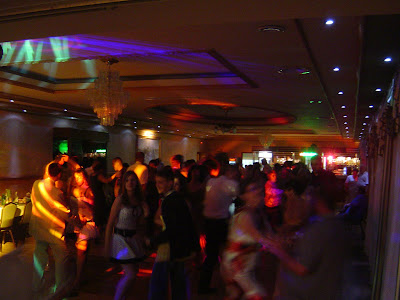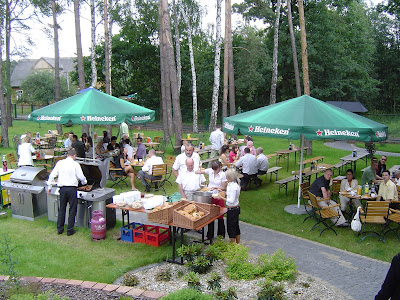 I have often heard that few people party as long or drink as hard as the Polish at their weddings. To ascertain this claim, I have hoped to have the opportunity to check out such a celebration. This past weekend one of my roommate's friends was going to a wedding in a Southern town Kielce and graciously agreed to take me along.
I have often heard that few people party as long or drink as hard as the Polish at their weddings. To ascertain this claim, I have hoped to have the opportunity to check out such a celebration. This past weekend one of my roommate's friends was going to a wedding in a Southern town Kielce and graciously agreed to take me along.Of course I've forgotten to bring my camera to the wedding ceremony, but no one else was taking pictures either, so I figured it just as well. Pretty much all the weddings in Poland are a Catholic affair and very traditional. This one was no exception, taking place in a little wooden church, traditionally in the bride's parish. After the ceremony, buses, as old as the Communist roads they drove on, took us to the wedding hall for two days of eating and drinking. Unlike American weddings I've been to, guests in Poland are, as much as the room allows, seated at long tables. While often that leads to place trading and fights for seating closer to the bride and groom, in my opinion it is the key to a more inclusive celebration.
 The wedding party begins with food immediately after everyone enters the wedding hall. Soup, a second course and deserts are placed in quick succession. Another set of waiters places an ice cold bottle of vodka is between each four people. The vodka is tapped at regular intervals throughout the night, measuring the long hours with many, many toasts of long life and prosperity to the newlyweds. As the dinner dishes are cleared from the tables what remains are ever more numerous empty vodka bottles, chasers and mixers, and finger food of fish and cold cuts. Of to the side was a "village" table covered with hams, sausages, mushrooms, beacon, pickles, and bread, frequented mostly by men. For the brave there was also a table with "bimber," or 150 proof home made vodka. I would just like to say that after trying that stuff, regular vodka went down like apple juice - and yes, you could even taste some sweetness.
The wedding party begins with food immediately after everyone enters the wedding hall. Soup, a second course and deserts are placed in quick succession. Another set of waiters places an ice cold bottle of vodka is between each four people. The vodka is tapped at regular intervals throughout the night, measuring the long hours with many, many toasts of long life and prosperity to the newlyweds. As the dinner dishes are cleared from the tables what remains are ever more numerous empty vodka bottles, chasers and mixers, and finger food of fish and cold cuts. Of to the side was a "village" table covered with hams, sausages, mushrooms, beacon, pickles, and bread, frequented mostly by men. For the brave there was also a table with "bimber," or 150 proof home made vodka. I would just like to say that after trying that stuff, regular vodka went down like apple juice - and yes, you could even taste some sweetness. As the party went on and the participation in the numerous toasts began to wane, the band came into the dining room and began singing traditional Polish wedding songs. The young and the old alike joined hands and sang together about the bright future of the newlyweds and, curiously, about lost love. I have observed that many Polish songs, both in the popular culture and the wedding repertoire, are about the good old days long gone and unrequited love.
As the party went on and the participation in the numerous toasts began to wane, the band came into the dining room and began singing traditional Polish wedding songs. The young and the old alike joined hands and sang together about the bright future of the newlyweds and, curiously, about lost love. I have observed that many Polish songs, both in the popular culture and the wedding repertoire, are about the good old days long gone and unrequited love. The party went on alternating between dancing to not to be heard anywhere else Polish wedding songs, games along the lines of musical chairs, and regular breaks announced by the band for either more vodka, or more food. Apparently there is something of a wedding timekeeping system punctuated by different foods. One of the breaks was hot potato noodles with gravy at about midnight and at about 2AM red barszcz, announcing the end of official celebration. After the barszcz it was apparently ok to leave, though the party went on for many more hours, finally ending with the band kicking everyone out at about 6AM.
The party went on alternating between dancing to not to be heard anywhere else Polish wedding songs, games along the lines of musical chairs, and regular breaks announced by the band for either more vodka, or more food. Apparently there is something of a wedding timekeeping system punctuated by different foods. One of the breaks was hot potato noodles with gravy at about midnight and at about 2AM red barszcz, announcing the end of official celebration. After the barszcz it was apparently ok to leave, though the party went on for many more hours, finally ending with the band kicking everyone out at about 6AM. The next morning, well at about 2PM, started poprawiny, or the second day of partying loosely translated as corrections. More meats, sausages, bigos, soups in bread bowls, deserts, and definitely more vodka, welcomed by everyone's hangovers. While the party started a little more slowly than the night before, it picked up quickly and lasted well into the night. While the young people mostly sat around the tables and talked, a group of 6 couples, I guess in their forties, were living it up. They had a guitar with then and sang many traditional campfire songs, drank more bimber, brought outside specially for them. I bowed out at about 8PM to catch a grimy train full of smokers back to Warsaw, but at that point I was just happy to sit somewhere quietly without someone offering another toast every fifteen minutes.
The next morning, well at about 2PM, started poprawiny, or the second day of partying loosely translated as corrections. More meats, sausages, bigos, soups in bread bowls, deserts, and definitely more vodka, welcomed by everyone's hangovers. While the party started a little more slowly than the night before, it picked up quickly and lasted well into the night. While the young people mostly sat around the tables and talked, a group of 6 couples, I guess in their forties, were living it up. They had a guitar with then and sang many traditional campfire songs, drank more bimber, brought outside specially for them. I bowed out at about 8PM to catch a grimy train full of smokers back to Warsaw, but at that point I was just happy to sit somewhere quietly without someone offering another toast every fifteen minutes.

No comments:
Post a Comment